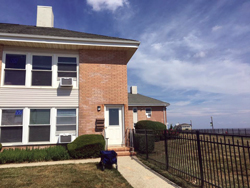House or apartment hunting in West Long Branch, Oakhurst, and Deal can be exciting prospective to student renters, but once the town stipulations and costs of renting are revealed, that enthusiasm wanes.
The current Monmouth University housing policies do not guarantee juniors and seniors on-campus housing, which leads to a large population of students that reside in the neighboring towns of the University for the academic school year.
After a student’s freshman year, the Office of Residential Life utilizes a housing selection system to determine who will receive on-campus housing. According to the University’s website, this system randomly assigns upperclassmen who have submitted a housing deposit a number to determine the order of selection. Once on-campus housing options are at full capacity, a waitlist is then generated for those who wish to live on campus.
Students who are not placed in on-campus or university sponsored off-campus housing must begin their search for roommates and an apartment or house to rent for the next year. According to the University website, out of approximately 4,000 full-time undergraduate students, 2,000 students live in the surrounding communities or commute from home.
A rental in Monmouth County ranges from $1,200 to $3,600 a month depending on how many people will occupy the residence. Students with housemates typically pay individually anywhere between $450 to $700 per month without utilities. For gas, water, electric, cable, and ground maintenance each roommate pays approximately $100 or more each month. The tenant might be responsible for additional expenses to ensure that their landlord’s property is in accordance with town rules and regulations.
The Division of Housing, Code Enforcement and Clean Communities in Monmouth County is responsible for enforcing all ordinances within the town to ensure the quality of life for community residents.
The administrative secretary of Code Enforcement, Melissa Laing, refers landlords and tenants to a document that lists ordinances that are frequently violated. Landlords hold renters responsible for maintaining these duties such as: property maintenance, trash disposal, and parking off driveway. According to the document issued by Ocean Township, grass cannot grow over 10 inches and bushes near the sidewalk area cannot be over 4 feet in height. Student renters are expected pay an extra $70 each month to hire landscapers to cut the grass to follow these regulations.
“Once the student signs the leasing contract, the house is theirs and they should responsible for paying to maintain their house for the duration of the nine months,” said Joseph Di Bella, a landlord for over 40 years.
During her search for an off-campus rental, Lauren Gnoinski, a freshman transfer student, discovered that most landlords reside in New York. Gnoinski reported that a majority of the property-owners in the surrounding areas of the University are not permanent residents of Monmouth County.
Gnoinski expressed issues with scheduling times to visit the rentals due to their need to travel a long distance to the property. “I can’t imagine how long it would take these landlords to get to their property in the case of an emergency. If I needed something in the house fixed immediately, it would take them hours or days to find time to come and repair the issue,” she said.
Students who are renting houses or apartments are often neglected by their landlords and left to live in unsafe conditions.
Samantha Guido, a senior communication student, has had several problems with her house this semester that were ignored by her landlord. “For three weeks during the winter my heat was broken. I had to buy a space heater just to stay warm.” Guido’s landlord fixed the problem a month after she called him.
While living on campus at Monmouth University, students can contact Facilities Management and file a work order if they are in need of maintenance for their dormitory. Alyssa Cosentino, one of the few seniors that are currently residing in Maplewood Hall sent in a work order for a broken lock on her bedroom door and within a day the door was fixed.
Guido waited two months for her heat to be fixed by her landlord, as opposed to Cosentino, who waited one day for Facilities Management to promptly fix the problem. In some cases, the negligence of property-owner fosters costly and hazardous living conditions for student renters.
Allison Perrine, a recent graduate of Monmouth and frequent student renter, said, “A toilet was constantly running and our landlord neglected to fix it. Later that month, our water bill was through the roof, nearly tripled in price due to this issue that he neglected to address. We had to have him split the bill with us and it became a whole ordeal because he originally did not want to pay.”
Perrine and her roommates also discovered that there was a flood in their basement, which has led to an infestation of black mold. The health effects of black mold include chronic coughing, sneezing, and nausea. Perrine contacted her landlord about the infestation and was ignored.
In most of the property leasing contracts, the tenants must agree to maintain and respect the property of the landlord, but in many cases it seems as if the landlord disregards the needs of their tenants.
Lorna Gnoinski, Lauren Gnoinski’s mother, voiced concerns about the various stipulations outlined in these leases for first-time renters. Some leases hold renters responsible for changing boiler filters, buying renter’s insurance and replacing broken appliances.
Seeking and committing to an off-campus rental is a stressful experience for both students and parents. She continued, “Since young adults cannot rent a house or apartment due to their lack of collateral, myself along with the other student’s parents are responsible for ensuring that the rent is paid each month even if one roommate decides to not move in,” said Mrs. Gnoinski.
Living on campus eliminates the concerns of finding a realtor, a safe house, and signing a lease that has many legal stipulations. Amongst balancing assignment deadlines and extracurricular activities, students are also burdened with the pressure of becoming first-time renters.
While working with a real estate agent, Buell felt pressured to rent a property quickly. Since most students occupy the limited number of available houses near campus by the spring semester, there is additional stress put on student renters to promptly make a decision and pick a rental.
“Every day my realtor would contact me, asking if I made a decision about the house. She told me several times that if I did not get back to her in a few days, the house would no longer be available. This time frame allotted a short amount of time for my roommates and me to discuss finances and contact our parents,” she said.
Residing on campus ensures that each student will have a safe place to live, free from mold, intrusion, and property liability.
Monmouth University’s inability to guarantee housing for upperclassmen has burdened students with obstacles that can be detrimental to their health, finances, and academics.
Cosentino said, “I enjoy living on campus because I know that I am living in a safe environment. I am free of all distractions that comes with being a renter and can simply focus on the reason I came to Monmouth, which was to focus on my studies.”




